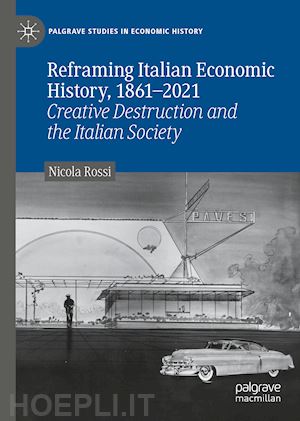
Questo prodotto usufruisce delle SPEDIZIONI GRATIS
selezionando l'opzione Corriere Veloce in fase di ordine.
Pagabile anche con Carta della cultura giovani e del merito, 18App Bonus Cultura e Carta del Docente
This book surveys the development of the Italian economy over the 150 years since unification, integrating economic analysis with an economic and social history of Italian society.
The book challenges several key assumptions about the growth of the Italian economy, including the notion that Italy has ‘caught up’ with its main Western partners and arguing that in long-run perspective the Italian economy has performed disappointingly. In particular, the book highlights how the role of cultural values, beliefs and preferences are just as important as institutions and institutional change in explaining the trajectory of the economy, arguing that a widespread ‘growth-averse’ culture exists in Italian society that diverges from the dominant market paradigms of the Western world. Rather than treating the twenty years after WWII – the period of rapid growth known as Italy’s ‘economic miracle’ years – as an indicator of Italy’s success, the author analyses these years as an anomaly where capitalist processes like creative destruction and innovism were briefly permitted to flourish. The book draws out key questions, for example exploring why institutional reforms have not led to sustained rates of growth, and why other markers of quality of life have improved in Italy while economic performance has remained slow. This book will be a fascinating read for scholars of economics and economic history, as well as non-specialist readers looking for a comprehensive understanding of Italian socio-economic conditions since the country's unification.
Introduction.- Chapter 1. A Different Perspective.- Chapter 2. Italian business dynamism.- Chapter 3. Beliefs, values and preferences.- Chapter 4. Re-reading Italian economic events.- Chapter 5. Bumblebees don't exist.- Conclusions.
Nicola Rossi is a former full professor of economics at the University of Rome Tor Vergata. Throughout his career he has moved back and forth from the academic world to employment at economic institutions (the Bank of Italy from 1977 to 1980 and the International Monetary Fund from 1986 to 1987) and the realm of politics (as economic advisor to the Italian prime Minister from 1998 to 2000, as Member of Parliament from 2001 to 2008 and, finally, as member of the Italian Senate from 2008 to 2013).











Il sito utilizza cookie ed altri strumenti di tracciamento che raccolgono informazioni dal dispositivo dell’utente. Oltre ai cookie tecnici ed analitici aggregati, strettamente necessari per il funzionamento di questo sito web, previo consenso dell’utente possono essere installati cookie di profilazione e marketing e cookie dei social media. Cliccando su “Accetto tutti i cookie” saranno attivate tutte le categorie di cookie. Per accettare solo deterninate categorie di cookie, cliccare invece su “Impostazioni cookie”. Chiudendo il banner o continuando a navigare saranno installati solo cookie tecnici. Per maggiori dettagli, consultare la Cookie Policy.